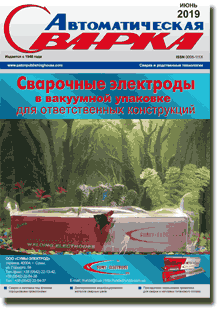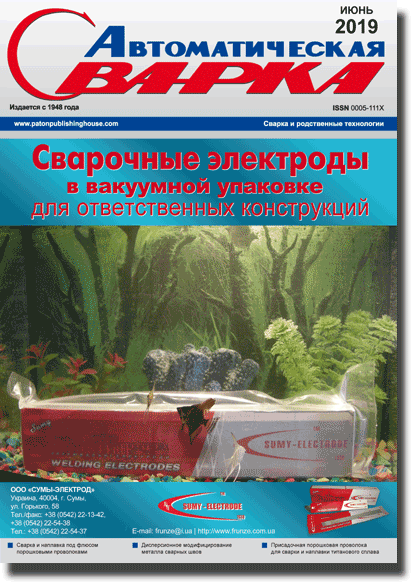| 2019 №06 (03) |
DOI of Article 10.15407/as2019.06.04 |
2019 №06 (05) |

Avtomaticheskaya Svarka (Automatic Welding), #6, 2019, pp.29-32
Influence of refractory dispersed phases on physico-chemical properties of slag melts of the system MgO-Al2O3-SiO2-CaF2
I.O. Goncharov1, V.S. Sudavtsova1, D.D. Mishchenko1, A.M. Duchenko1, V.E. Sokolsky2
1E.O. Paton Electric Welding Institute of the NAS of Ukraine. 11 Kazimir Malevich Str., 03150, Kyiv, Ukraine. E-mail: office@paton.kiev.ua
2Taras Shevchenko National University of Kyiv. 60 Volodymyrska Str., 01601, Kyiv, Ukraine
The article is devoted to the study of basic mechanisms of control of structure and physical and chemical properties of slag oxide-fluoride melts in order to create fluxes with predicted chemical, metallurgical and technological parameters for welding high-strength low-alloyed steels. The addition of MgO in the slag melts of the system MgO-Al2O3-SiO2-CaF2 provides an abnormal decrease in the thermodynamic activity of silicon oxide in them due to the formation of a refractory dispersed phase MgO·Al2O3 in the melt. Based on the methods of internal standard and the proposed gravimetric procedure for determination of quantitative content of MgO·Al2O3 in liquid and solid slags of the system MgO-Al2O3-SiO2-CaF2 its optimum content in a slag melt was determined, in which the combination of optimal chemical, metallurgical and technological properties of flux during electric arc welding is provided. 12 Ref., 1 Tabl., 5 Fig.
Keywords: fluxes for electric arc welding, slag melts, refractory dispersed particles, toughness, electric conductivity, thermodynamic activity
Received: 15.04.2019
Published: 20.05.2019
References
1. Mysen, B.O. (1988) Structure and properties of silicate melts. Amsterdam, Elsevier.2. Mills, K.C. (1993) The influence of structure on the physicochemical properties of slags. ISIJ Int., 1, 148-155. https://doi.org/10.2355/isijinternational.33.148
3. Mills, K.C., Yuan, L, Jones, R.T. (2011) Estimation the physical properties of slags. The J. of Southern African Institute of Mining and Metallurgy, 111, 649-658.
4. Zajtzev, A.I., Shakhpazov, E.Kh. (2009) Development of modern theory of metallurgical slags. Metallurg, 5, 27-31 [in Russian].
5. Zajtzev, A.I., Mogutnov, B.M., Shakhpazov, E.Kh. (2008) Physical chemistry of metallurgical slags. Moscow, Interkontakt Nauka [in Russian].
6. Zhuangzhuang Liu, Lieven Pandelaers, Bart Blanpain, Muxing Guo (2018) Viscosity of heterogeneous silicate melts: A Review. Metallurgical and Materials Transact. B, Oct., 49(5), 2469-2486. https://doi.org/10.1007/s11663-018-1374-9
7. Park, J.H. (2007) Solidification structure of CaO-SiO2-MgO-Al2O3(-CaF2) systems and computational phase equilibria: Crystallization of MgAl2O4 spinel. Computer Coupling of Phase Diagrams and Thermochemistry, 31, 428-437. https://doi.org/10.1016/j.calphad.2007.05.005
8. Christensen, N., Chipman, J. (1953) Slag-metal interaction in arc welding. Weld. Res. Counsil Bul. Ser., 15, 18.
9. (1995) Slag Atlas. 2nd Ed. Verlag Stahleisen GmbH, D-Dusseldorf.
10. (1985) Slag Atlas: Refer. Book. Moscow, Metallurgiya [in Russian].
11. Goncharov, I.A., Sokolsky, V.E., Davidenko, A.O. et al. (2012) Formation of spinel in melt of the MgO-Al2O3-SiO2-CaF2 system agglomerated welding flux and its effect on viscosity of slag. The Paton Welding J., 12, 18-25.
12. Goncharov, I.A., Galinich, V.I., Mishchenko, D.D. et al. (2013) Methods of control of silicon oxide activity in slag melts. Ibid., 2, 8-12.
The cost of subscription/purchase order journals or individual articles
| Journal/Currency | Annual Set | 1 issue printed |
1 issue |
one article |
| TPWJ/USD | 384 $ | 32 $ | 26 $ | 13 $ |
| TPWJ/EUR | 348 € | 29 € | 24 € | 12 € |
| TPWJ/UAH | 7200 UAH | 600 UAH | 600 UAH | 280 UAH |
| AS/UAH | 1800 UAH | 300 UAH | 300 UAH | 150 UAH |
| AS/USD | 192 $ | 32 $ | 26 $ | 13 $ |
| AS/EUR | 180 € | 30 € | 25 € | 12 € |
| SEM/UAH | 1200 UAH | 300 UAH | 300 UAH | 150 UAH |
| SEM/USD | 128 $ | 32 $ | 26 $ | 13 $ |
| SEM/EUR | 120 € | 30 € | 25 € | 12 € |
| TDNK/UAH | 1200 UAH | 300 UAH | 300 UAH | 150 UAH |
| TDNK/USD | 128 $ | 32 $ | 26 $ | 13 $ |
| TDNK/EUR | 120 € | 30 € | 25 € | 15 € |
AS = «Automatic Welding» - 6 issues per year;
TPWJ = «PATON WELDING JOURNAL» - 12 issues per year;
SEM = «Electrometallurgy Today» - 4 issues per year;
TDNK = «Technical Diagnostics and Non-Destructive Testing» - 4 issues per year.




